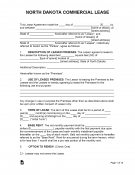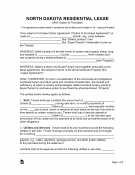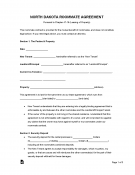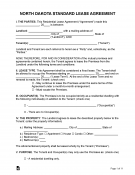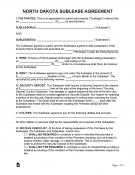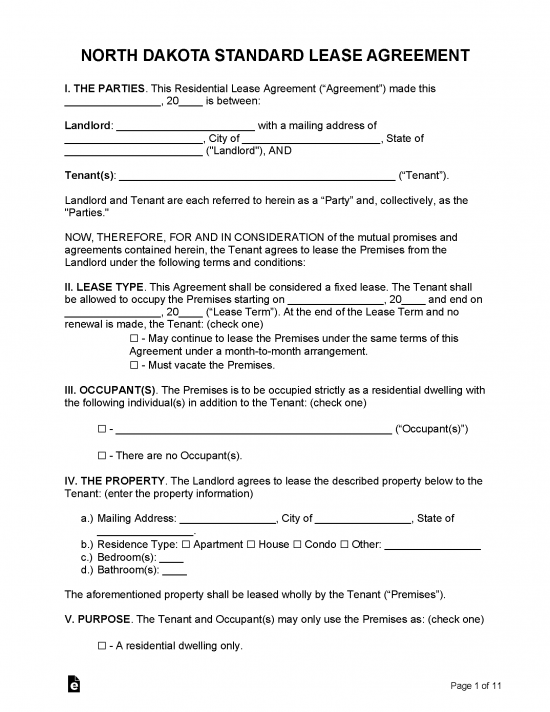North Dakota lease agreements govern tenants’ leases of landlords’ property in exchange for rent. The agreement will name the monthly rent, identify which party is responsible for utilities, and clarify the various obligations of both landlords and tenants. As a result, lease agreements can be valuable tools for both landlords and tenants to understand their rights under a lease.
Contents
By Type (6)
- Commercial Lease Agreement
- Month-to-Month Lease Agreement
- Rent-to-Own Lease Agreement
- Roommate Lease Agreement
- Standard Lease Agreement
- Sublease Agreement
Download: Adobe PDF, MS Word, Rich Text Format
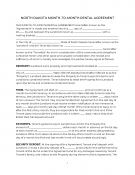 Month-to-Month Lease Agreement
Month-to-Month Lease Agreement
Download: Adobe PDF, MS Word, Rich Text Format
Download: Adobe PDF, MS Word, Rich Text Format
Download: Adobe PDF, MS Word, Rich Text Format
Download: Adobe PDF, MS Word, Rich Text Format
Download: Adobe PDF, MS Word, Rich Text Format
Landlord-Tenant Laws
Statutes – Title 47, Chapter 16 (Leasing of Real Property)
Required Disclosures (2)
Lead-Based Paint Disclosure – In leases of property with dwelling units constructed before 1978, federal law requires landlords to provide information about the hazards of lead-based paints.
Property Condition Statement – When a tenant moves in, the landlord must provide a form describing the condition of various parts of the rental property. If the tenant does not object when moving in, the descriptions included on the form may later be used by the landlord for various purposes, including retention of a security deposit. (§ 47-16-07.2)
Security Deposit Laws
Maximum Amount ($)
In most cases, landlords may not charge more than one (1) month’s rent as a security deposit. However, a landlord may require a deposit of up to two months rent if the tenant is a convicted felon, or if a court has found that the tenant violated the terms of a past rental agreement. For tenants with pets that are not service animals, landlords may also charge a “pet security deposit” that is less than the greater of $2500 or two (2) month’s rent. (§47-16-07.1)
Returning to Tenant
Security deposits should be kept in secure, interest-bearing accounts, and the interest is the property of the tenant once the tenant has been in the property longer than nine (9) months. The landlord must return any security deposit, plus accrued interest, to the tenant within thirty (30) days of the termination of the lease and the tenant’s turning over possession of the property.
A landlord may retain all or a portion of a security deposit only to (i) account for unpaid rent, (ii) pay for cleaning or repairs necessary for the property other than those resulting from normal wear and tear, and (iii) remedy a tenant’s violations of a lease agreement. If a landlord is going to retain any of the security deposit, the landlord must provide a written itemization to tenant, also within thirty (30) days, to the tenant’s last known address. (§47-16-07.1)
When is Rent Due? (grace period)
Because there is no statute on due dates or grace periods, rent is due at the time and place named in the lease agreement.
Eviction Notice (non-payment)
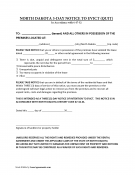 3-Day Notice to Pay or Quit – If a tenant fails to pay rent on the day it is due, a landlord may inform the tenant that, if rent is not paid within three days, the landlord has the right to terminate the lease. To do so, the landlord must deliver this notice to tenant, or post it on the property’s dwelling unit. (§47-32)
3-Day Notice to Pay or Quit – If a tenant fails to pay rent on the day it is due, a landlord may inform the tenant that, if rent is not paid within three days, the landlord has the right to terminate the lease. To do so, the landlord must deliver this notice to tenant, or post it on the property’s dwelling unit. (§47-32)
Download: Adobe PDF
Maximum Fees ($)
Late Rent Penalties
North Dakota does not have statutes governing late fees, but if a landlord wishes to charge a fee for providing late rent, the fee should be clearly named in the lease agreement.
NSF Checks
North Dakota does not have a specific statute for rent checks linked to accounts with insufficient funds. However, if any party in the state, regardless of whether it takes place in the context of a landlord-tenant relationship, offers a check with insufficient funds and fails to pay the full amount within fourteen (14) days of being notified of the problem, the person may be subject to fines and penalties. (§6-08-16)
Tenant’s Unclaimed Property
If a landlord finds personal property belonging to a tenant within a dwelling unit after the termination of a lease, or after it reasonably appears that the tenant has vacated the premises, the landlord should store the property in a dry secure location and provide notice to the tenant.
If the property appears to be worth less than $2,500, the landlord may sell the property and keep the proceeds if the property goes unclaimed for more than twenty-eight (28) days; if the property appears to be worth more than $2,500, the landlord should consult an attorney, as additional legal processes may be necessary. Whether or not the property is claimed by the tenant, the landlord may deduct the cost of storing the personal property from the tenant’s security deposit. (§47-16-30.1)
